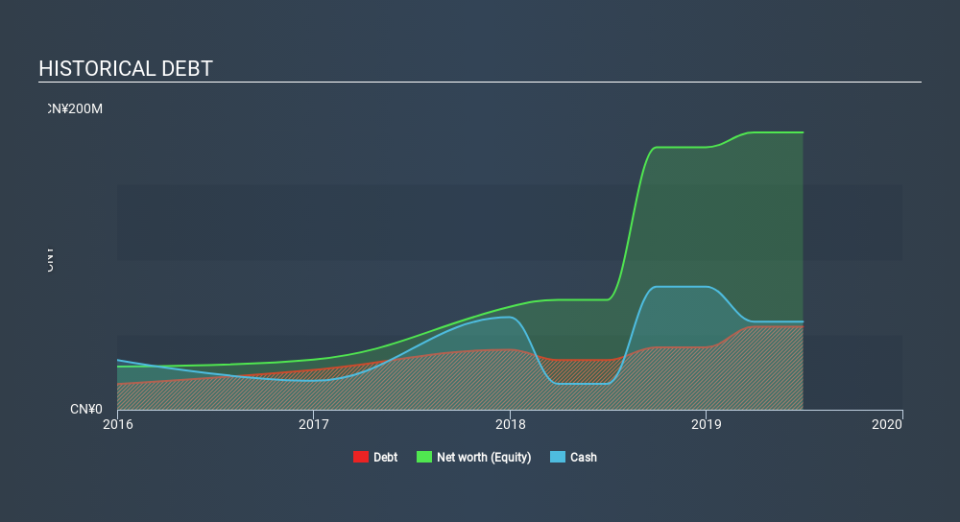Does Miji International Holdings (HKG:1715) Have A Healthy Balance Sheet?

The external fund manager backed by Berkshire Hathaway's Charlie Munger, Li Lu, makes no bones about it when he says 'The biggest investment risk is not the volatility of prices, but whether you will suffer a permanent loss of capital. So it might be obvious that you need to consider debt, when you think about how risky any given stock is, because too much debt can sink a company. We note that Miji International Holdings Limited (HKG:1715) does have debt on its balance sheet. But should shareholders be worried about its use of debt?
When Is Debt Dangerous?
Debt is a tool to help businesses grow, but if a business is incapable of paying off its lenders, then it exists at their mercy. In the worst case scenario, a company can go bankrupt if it cannot pay its creditors. However, a more usual (but still expensive) situation is where a company must dilute shareholders at a cheap share price simply to get debt under control. Having said that, the most common situation is where a company manages its debt reasonably well - and to its own advantage. When we think about a company's use of debt, we first look at cash and debt together.
Check out our latest analysis for Miji International Holdings
What Is Miji International Holdings's Net Debt?
The image below, which you can click on for greater detail, shows that at June 2019 Miji International Holdings had debt of CN¥55.3m, up from CN¥33.0m in one year. However, it does have CN¥58.7m in cash offsetting this, leading to net cash of CN¥3.37m.
How Healthy Is Miji International Holdings's Balance Sheet?
We can see from the most recent balance sheet that Miji International Holdings had liabilities of CN¥81.3m falling due within a year, and liabilities of CN¥10.6m due beyond that. On the other hand, it had cash of CN¥58.7m and CN¥101.9m worth of receivables due within a year. So it can boast CN¥68.6m more liquid assets than total liabilities.
This excess liquidity suggests that Miji International Holdings is taking a careful approach to debt. Because it has plenty of assets, it is unlikely to have trouble with its lenders. Succinctly put, Miji International Holdings boasts net cash, so it's fair to say it does not have a heavy debt load!
In fact Miji International Holdings's saving grace is its low debt levels, because its EBIT has tanked 31% in the last twelve months. When a company sees its earnings tank, it can sometimes find its relationships with its lenders turn sour. There's no doubt that we learn most about debt from the balance sheet. But you can't view debt in total isolation; since Miji International Holdings will need earnings to service that debt. So if you're keen to discover more about its earnings, it might be worth checking out this graph of its long term earnings trend.
Finally, a company can only pay off debt with cold hard cash, not accounting profits. Miji International Holdings may have net cash on the balance sheet, but it is still interesting to look at how well the business converts its earnings before interest and tax (EBIT) to free cash flow, because that will influence both its need for, and its capacity to manage debt. Over the last three years, Miji International Holdings saw substantial negative free cash flow, in total. While that may be a result of expenditure for growth, it does make the debt far more risky.
Summing up
While we empathize with investors who find debt concerning, you should keep in mind that Miji International Holdings has net cash of CN¥3.37m, as well as more liquid assets than liabilities. So we don't have any problem with Miji International Holdings's use of debt. The balance sheet is clearly the area to focus on when you are analysing debt. But ultimately, every company can contain risks that exist outside of the balance sheet. Consider for instance, the ever-present spectre of investment risk. We've identified 3 warning signs with Miji International Holdings (at least 1 which is a bit concerning) , and understanding them should be part of your investment process.
If you're interested in investing in businesses that can grow profits without the burden of debt, then check out this free list of growing businesses that have net cash on the balance sheet.
If you spot an error that warrants correction, please contact the editor at editorial-team@simplywallst.com. This article by Simply Wall St is general in nature. It does not constitute a recommendation to buy or sell any stock, and does not take account of your objectives, or your financial situation. Simply Wall St has no position in the stocks mentioned.
We aim to bring you long-term focused research analysis driven by fundamental data. Note that our analysis may not factor in the latest price-sensitive company announcements or qualitative material. Thank you for reading.

 Yahoo News
Yahoo News 

